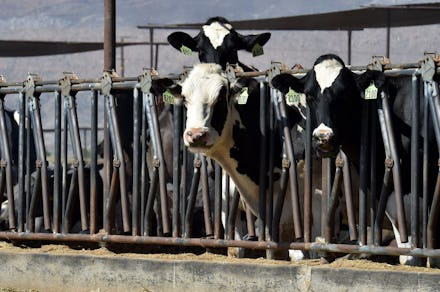Your Next Steak Could Come From a Cow Clone

Carnivores, rejoice: Your next steak could be biologically perfect, thanks to cloning.
Ty Lawrence, director of the Beef Carcass Research Center at West Texas A&M University, believes he can create the best possible meat over and over again, thanks to a complicated but promising process of cloning and breeding. A successful process would mean cows that are both high quality and high yield; a Goldilocks zone that could make a fortune for the cattle industry.
"High-quality cattle, those that end up at white tablecloth restaurants, are typically very low-yielding ... as they have lots of trim fat," Lawrence told Texas Standard. "We're looking to improve taste fat without the waste fat."
In traditional artificial selection or selective breeding — the process used in most aspects of farming to get the best-possible traits of a plant or animal — a farmer would just find its best-looking cows and breed them. But that takes generations. Lawrence, instead, took genes from two high-quality cow carcasses and put them back into living animals.
"We've used cloning to recapture that carcass into a live animal," Lawrence said, "and then we've crossbred those live animals to get those calves, to see if we're successful or not thus far."
From the sounds of it, Lawrence's plan wouldn't be to fill supermarkets with cloned meat. Instead, the cloning speeds up the breeding process — eliminating some of the extra time spent on the slow, natural breeding of artificial selection — to get the perfect model cows. Once those cows are ready, breeding can begin.
"The first seven steers that we have evaluated are worth about $140 more per animal than the average steer of the same weight," Lawrence said.
According to Lawrence, it will still take a few years to troubleshoot and run tests, since he needs to compare his perfect cow sire to other popular sires throughout the industry, to see where he stands. But once that happens, it could usher in the future of eating: the best steak you've ever had, every single time.
It could just be wishful thinking, but if those high-quality, low-yield cows Lawrence mentioned are replaced by high-quality, high-yield cows, maybe the cattle industry can lower its waste output — the parts of the cow they'd just throw away — and, ultimately, take some of the burden off the environment. Fingers crossed.
Read more: